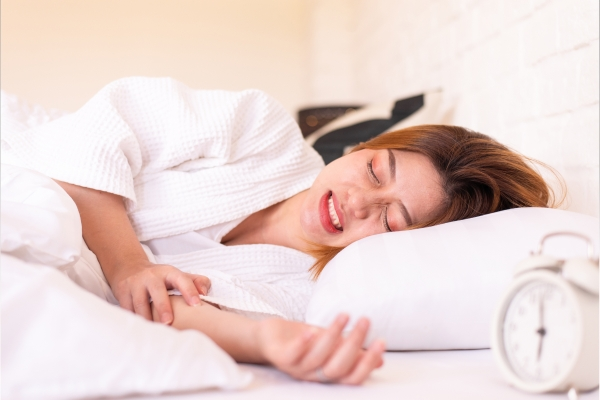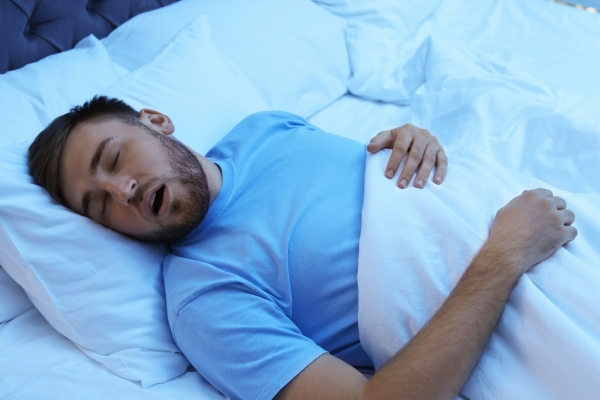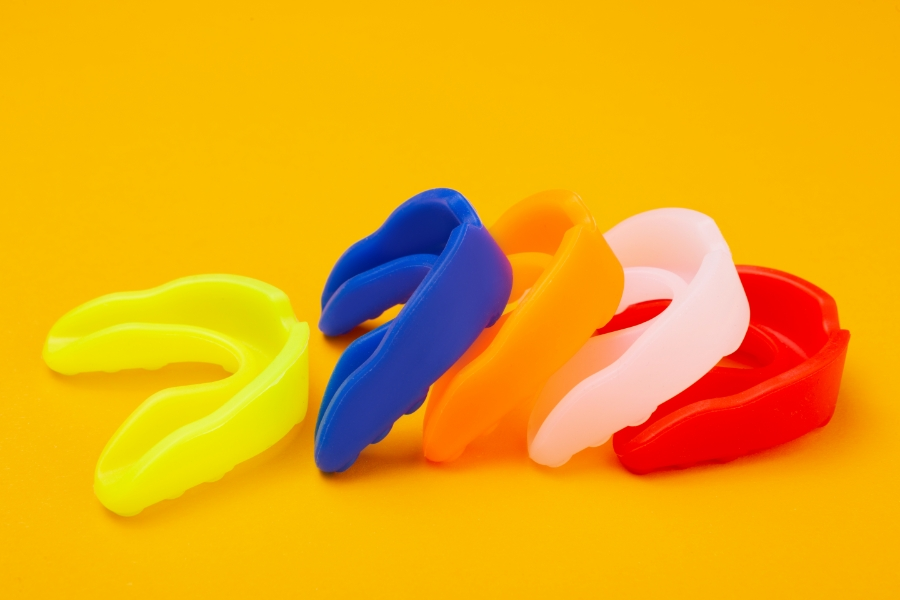The biggest misconception around mouthguards has to be that you only need one if you play sports or if you are a professional athlete. The truth is, there are so many other important reasons besides sports that require wearing a mouthguard. Mouth guards are extremely beneficial for most people and not just athletes! The whole purpose of a mouthguard is to protect your teeth, and if you clench your jaw or grind your teeth then you would benefit the most from a mouth guard. So let’s get into the reasons why you might need a mouth guard and also explore the different types that you can pick and choose from!
What Exactly is a Mouth Guard?
A mouthguard is a protective device that you wear over your teeth. It’s usually made of a flexible plastic material and is designed to protect your teeth, gums, and mouth from injury during activities like sports or at night if you grind your teeth. You simply place it in your mouth, and it acts as a cushion to absorb and distribute the force of any impact which is going to protect your teeth.
Signs You Need To Wear A Mouthguard
Let’s talk about some of the top signs you need to wear a mouthguard to protect your teeth.
What Conditions Are Mouth Guards Best For?
1. You’re a Teeth Grinder

A mouthguard is essential if you are already aware that you grind your teeth. During the day, do you ever find yourself clenching your jaw or grinding your teeth? Or has someone in your family heard you bruxism as you sleep at night? These two clear signs suggest that you are unintentionally harming your teeth as you sleep, even if it can be difficult to recognize exactly what your mouth is doing.
- Mouthguards prevent damage from nighttime teeth grinding.
- Daytime jaw clenching can signal the need for a mouthguard.
- Grinding noises at night suggest potential dental harm.
- Identifying these habits early helps in protecting your teeth.
- Using a mouthguard can reduce long-term dental issues.
2. Waking Up With a Sore Mouth and Face
If you wake up with a sore jaw and mouth, it might be because you grind your teeth while you sleep. This grinding, also called bruxism, puts a lot of pressure on your jaw and teeth, causing pain and discomfort. The good news is, you can easily solve this problem by using a mouthguard. A mouthguard acts as a cushion, protecting your teeth and jaw from the harmful effects of grinding. It helps you wake up feeling better and prevents further damage to your teeth.
- Waking up with a sore jaw and face may mean you grind your teeth at night.
- Teeth grinding, or bruxism, causes pressure and pain in your jaw and teeth.
- Using a mouthguard can protect your teeth and jaw.
- A mouthguard acts as a cushion, reducing the harmful effects of grinding.
- It helps prevent further damage and alleviates morning discomfort.
3. You Wake Up With a Headache or Migraine

Waking up with a headache or migraine can be frustrating and disruptive. One possible cause is teeth grinding, which can happen without you even knowing it while you sleep. This grinding puts stress on your jaw and head muscles, leading to pain. To alleviate this issue, wearing a mouthguard at night can be an effective solution. The mouthguard helps by providing a barrier that absorbs the pressure, reducing the likelihood of waking up with a headache. With a mouthguard, you can enjoy a more comfortable and pain-free morning.
- Morning headaches or migraines might be linked to nighttime teeth grinding.
- Grinding your teeth unknowingly at night can stress your jaw and head muscles.
- Wearing a mouthguard at night can help prevent these morning headaches.
- The mouthguard absorbs pressure, reducing muscle stress.
- Using a mouthguard can lead to a more comfortable and pain-free morning.
4. Waking Up with a Sore Jaw
Waking up with a sore jaw can be a sign that you grind your teeth at night. This habit, often unnoticed while you sleep, exerts excessive pressure on your jaw muscles, leading to soreness and discomfort in the morning. A simple and effective solution is to use a mouthguard. By wearing a mouthguard at night, you can cushion your jaw, reduce the strain, and wake up without the soreness. This small adjustment can make a big difference in your daily comfort.
- Morning jaw soreness may indicate nighttime teeth grinding.
- Grinding teeth in sleep puts pressure on jaw muscles, causing discomfort.
- A mouthguard can cushion your jaw and reduce strain.
- Using a mouthguard at night helps prevent morning jaw pain.
- This solution improves daily comfort and reduces soreness.
5. You Have Been Diagnosed With A TMJ disorder or Bruxism
Being diagnosed with a TMJ disorder or bruxism can explain why you experience jaw pain, headaches, or discomfort. TMJ disorders affect the temporomandibular joint, causing pain and difficulty in jaw movement, while bruxism involves grinding your teeth, often during sleep. Both conditions can lead to significant discomfort and long-term dental issues. An effective way to manage these problems is by using a mouthguard. A mouthguard provides the necessary cushioning and support, alleviating pressure on your jaw and preventing teeth grinding. This simple device can help reduce pain and improve your overall oral health.
- TMJ disorders cause pain and difficulty in jaw movement.
- Bruxism involves grinding your teeth, often while sleeping.
- Both conditions can lead to significant discomfort and dental issues.
- Using a mouthguard can help manage these problems by providing cushioning and support.
- A mouthguard alleviates pressure on the jaw and prevents teeth grinding.
- This device helps reduce pain and improves overall oral health.
6. You Have Sleep Apnea

If you have sleep apnea, you might experience disrupted sleep and breathing difficulties at night. Sleep apnea occurs when your airway becomes blocked or collapses during sleep, leading to pauses in breathing and poor sleep quality. One effective way to manage sleep apnea is by using a specially designed mouthguard. This type of mouthguard helps keep your airway open by repositioning your lower jaw and tongue. By wearing a mouthguard, you can improve your breathing, reduce snoring, and enjoy a more restful night’s sleep.
- Sleep apnea causes disrupted sleep and breathing difficulties.
- It occurs when your airway becomes blocked or collapses during sleep.
- A specially designed mouthguard can help keep your airway open.
- The mouthguard repositions your lower jaw and tongue to improve breathing.
- Wearing a mouthguard reduces snoring and improves sleep quality.
- This helps you enjoy a more restful and uninterrupted sleep.
Different Types of Mouthguards You Can Get
1. Stock Mouthguards
Stock mouthguards are pre-formed and ready to wear. They are the most affordable option and can be found in most sporting goods stores. However, they come in a limited range of sizes and cannot be adjusted to fit your mouth, often making them bulky and uncomfortable.
2. Boil and Bite Mouthguards
Boil and bite mouthguards offer a better fit than stock options. Made from thermoplastic material, you soften them in boiling water and then bite into them to create a custom fit around your teeth. These mouthguards are more comfortable and provide better protection, making them a popular choice for many people.
3. Custom Mouthguards
Custom mouthguards are made specifically for your mouth by a dentist. They involve taking a precise mold of your teeth, ensuring the best fit and maximum protection. While they are the most expensive option, custom mouthguards offer the highest level of comfort, durability, and effectiveness, making them ideal for both sports and managing conditions like bruxism and sleep apnea.
How Getting A Custom Mouth Guard Can Help
Caring for your teeth is as vital as looking after other aspects of your health. Preventative measures are always the best approach when it comes to oral care.
If you ignore your dental issues, they can lead to more serious problems and sometimes irreversible damage. That’s why you should visit your dentist at the first sign of any dental irregularities.
Persistent jaw pain, facial muscle soreness, frequent headaches, and disrupted sleep are all indicators that something is amiss. If you experience these symptoms, it often points to sleep bruxism, a condition where you clench and grind your teeth at night. This habit can severely damage your teeth, cause significant pain, and lead to other health problems.
If you are dealing with sleep bruxism, you should use a custom mouthguard. Dentists highly recommend custom mouthguards because they are specifically tailored to fit your mouth perfectly while offering superior protection compared to standard options. They provide a comfortable fit and are designed to cushion your teeth against the damaging effects of grinding.
By using a custom mouthguard, you can effectively protect your teeth, alleviate pain, and ensure a healthy smile for years to come. We recommend getting a custom Mouthguard from ALIGNERCO, which costs only $125. You don’t need to wait for expensive dental appointments and can get your customized mouthguard delivered to your doorstep without any hassle.
Final Thoughts
Taking care of your teeth is crucial for overall health, and recognizing the signs that you need a mouthguard can prevent serious dental issues. Whether you experience jaw pain, headaches, disrupted sleep, or have been diagnosed with TMJ disorders or sleep apnea, a mouthguard can provide the protection and relief you need. Custom mouthguards offer a perfect fit and superior protection, ensuring your teeth remain healthy and your smile stays bright. Don’t ignore the signs, visit your dentist or order one online to protect your teeth from further damage.
FAQs
1. How do I know if I need a mouthguard?
If you wake up with jaw pain, headaches, or sore teeth, or if you notice any signs of teeth grinding, you should consider a mouthguard.
2. Can I use a store-bought mouthguard instead of a custom one?
Store-bought mouthguards provide some protection, but custom mouthguards are tailored to fit your mouth perfectly, offering superior comfort and effectiveness.
3. How long does a custom mouthguard last?
With proper care, a custom mouthguard can last several years. However, regular check-ups with your dentist are recommended to ensure it remains effective.
4. Can a mouthguard help with sleep apnea?
Yes, specially designed mouthguards can help keep your airway open, reducing snoring and improving sleep quality for those with mild to moderate sleep apnea.
